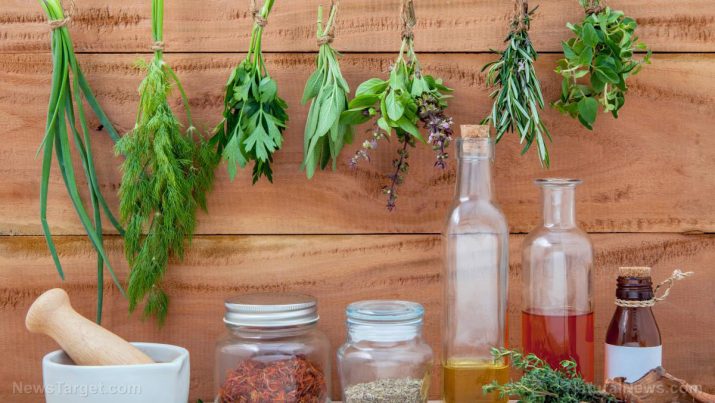A homesteader’s guide to dehydrating herbs for long-term storage
Thursday, November 15, 2018 by Zoey Sky
http://www.bugout.news/2018-11-15-a-homesteaders-guide-to-dehydrating-herbs-for-long-term-storage.html

Herbs can do more than boost the flavor of your dishes. Preppers know that various herbs deserve a place in their survival garden; these hardy plants don’t require as much water as vegetables, and they can be used as natural medicine, which is a crucial resource when SHTF. (h/t to BioPrepper.com.)
For instance, a sage leaf can be used as a natural band-aid because of its healing qualities.
Popular culinary herbs like oregano and thyme will thrive year-round in many parts of the U.S. For seasonal herbs, you can keep using them throughout the year by learning how to dehydrate them when they are at their freshest. You can also combine several herbs to create unique spice blends.
Herbs and other leafy greens are easy to dry for long-term use. A food dehydrator will help speed up the process, but you can still dehydrate herbs using a constant stream of air. (Related: Why you should learn about herbs in your area: Wild edibles and medicinal plants can offer food security.)
How to dehydrate herbs
The following are the basic steps for dehydrating herbs:
- Prepare the herbs by washing and placing them evenly on a drying rack. Make sure there’s enough space for proper air flow.
- Set temperature and time according to the directions on your dehydrator.
- Herbs must be 95 percent dehydrated for long-term storage.
Here are some suggestions for three spice blends that you can make using dehydrated herbs.
Cajun seasoning
Ingredients:
- 1/3 cup of salt
- 1/4 cup of paprika
- 1 tablespoon (tbsp) of basil
- 1 tbsp of dried oregano
- 1 tbsp of onion powder
- 1 tbsp of garlic powder
- 1 tbsp of ground black pepper
- 1 tbsp of ground coriander
- 2 teaspoons (tsp) of dried thyme
- 1/2 tsp of cayenne pepper
- 1/4 tsp of cumin
- 1/4 tsp of white pepper
Chili powder
Ingredients:
- 2 tbsp of dried oregano
- 2 tbsp of paprika
- 1 1/4 tsp of cayenne pepper
- 1 1/4 tsp of garlic powder
- 1 1/2 tsp of ground cumin
- 1 tsp of onion powder
French herb mix
Ingredients:
- 3 tbsp of dried thyme
- 2 tbsp of garlic powder
- 3 tbsp of marjoram
- 3 tbsp of summer savory
- 1 tsp of dried basil
- 1 tsp of dried rosemary
- 1 tsp of sage
- 1/2 tsp of ground fennel seeds
How to store dehydrated herbs
Dehydrated herbs can be stored longer than fresh herbs, but proper food storage is crucial regardless of the type of food that you are stockpiling. Dehydrated herbs should be stored in either heavy-duty zippered bags in a metal container, or in dry, sterile, glass jars. For long-term storage, consider using Mylar bags.
Before storage, food must be 95 percent dehydrated. Any moisture may enable the growth of microorganisms and molds, which will spoil your survival food stockpile. Store dehydrated food away from natural elements.
Below are some “best used by” guidelines for dehydrated food:
- Fruits and vegetables – At least 12 months.
- Meats – Best consumed at one to two months, but can be stored for six months.
- Spices – One to two years.
Always use fresh herbs when cooking to enhance the taste of your dishes, but don’t forget to also dehydrate some herbs so you can cook flavorful food even after SHTF.
Important spices for your survival stockpile
If you’re looking for more herbs and spices to store in your survival stockpile, here are some suggestions:
- Bay leaves – Use bay leaves to enhance the flavor of soups and stews.
- Dill weed and dill – Dill weed is an herb, but the seeds, or dill, are a spice. Add dill to egg dishes, potatoes, or tuna salad.
- Onion (freeze-dried or dehydrated) – Onions can be added to different savory dishes.
- Turmeric – Turmeric is a medicinal spice that is also great for making savory foods.
Looking for more herbs to add to your survival stockpile? Learn more about this and other uses for herbs at Herbs.news.
Sources include:
Tagged Under: Tags: dehydrating herbs, food independence, Food Preservation, Food storage, food supply, functional food, green living, Herbs, homesteading, how-to, off grid, preparedness, prepper, prepping, superfoods, survival, survival food, sustainable living

